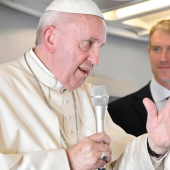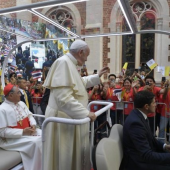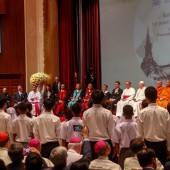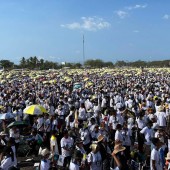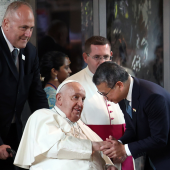Meeting at Shrine of Blessed Nicholas Bunkerd Kitbamrung on Nov 22, 2019
The Church faces many challenges today but the example of the first missionaries in Thailand and other Asian nations can give hope and strength.
That was a key point in the message Pope Francis delivered November 22, 2019, during a meeting with the Bishops of Thailand and of the Federation of Asian Bishops’ Conferences (FABC) at the Shrine of Blessed Nicholas Bunkerd Kitbamrung in Bangkok. It was the second of four major events the Holy Father held on this day.
Blessed Nicholas was sent as a missionary priest to northern Thailand in 1930 where he trained seminarians and worked to bring lapsed Catholics back to the faith. At a time of anti-Christian sentiment during World War II, he was arrested for “antipatriotic” acts and sentenced to 15 years in prison. He continued his missionary work there, baptizing 68 of his fellow prisoners. He died of tuberculosis in the prison hospital in 1944 at the age of 49.
“You are living in the midst of a multicultural and multi-religious continent, with great beauty and prosperity, but troubled at the same time by poverty and exploitation at various levels,” the Holy Father pointed out. “Rapid technological advancements can open up immense possibilities that make life easier but can result in the growth of consumerism and materialism, especially among young people.”
The Pope also noted the challenges the bishops face in dealing with drug abuse, human trafficking, caring for migrants, worker exploitation, and income disparity. But he stressed the need for pastors to intercede for the people in these difficulties.
“The memory of the first missionaries who preceded us with courage, joy and extraordinary stamina can help us take stock of our present situation and mission from a much broader, much more transformative perspective,” Francis suggested. “In the first place, that memory frees us from the belief that times past was always more favorable or better for the proclamation of the Gospel. It also helps us to avoid taking refuge in fruitless discussions and ways of thinking that end up making us turn in on ourselves, paralyzing any kind of action.”
Source: ZENIT



